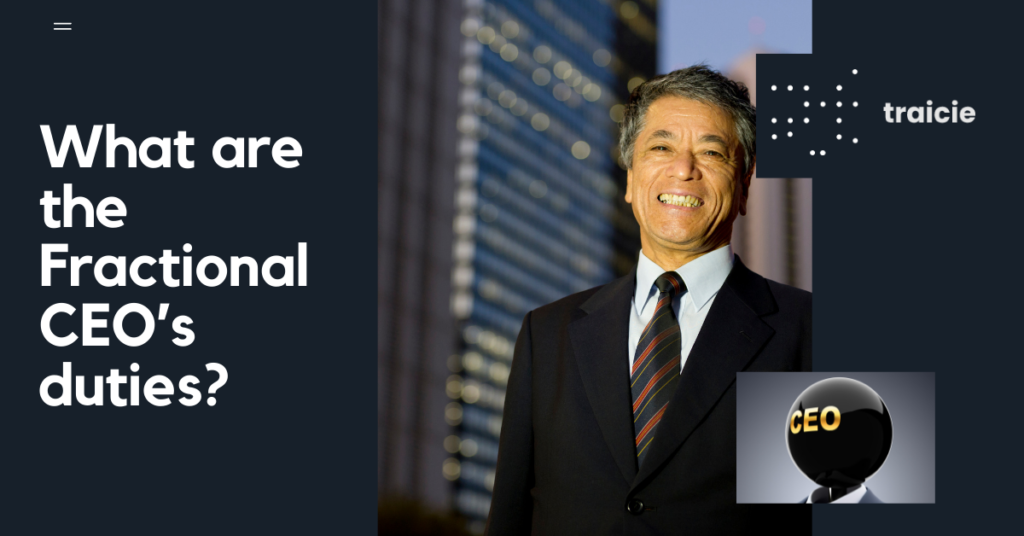Over the past few years, the phrase “Fractional CEO” has become more and more popular. The term has been noticed as the growing trend for mid-market businesses and expanding start-ups. The difficulty is that many company owners are confused about what a Fractional CEO is or how they may help your organization. Most importantly, where do you locate the ideal candidate?
Depending on your business, you should decide whether or not to hire one. Hiring a Fractional CEO does have several advantages. They will often support expansion and move your company in the right direction.
What is a Fractional CEO?
Fractional CEOs, often referred to as experienced CEOs, super temps and freelancers, can offer the same advantages as CEOs at a small portion of the price.
Fractional executives are managers who work part-time in your C-suite, including CIOs, CFOs, COOs and CHROs, to name a few. Additionally, it can be difficult for a founder or CEO to juggle all these tasks, while still running a firm, once your company reaches a specific size.
In brief, they are known as “fractional executives” and they work as consultants rather than being hired by anyone. They are often paid on a fee-for-service basis, a per-project basis or an hourly basis.

Fractional executives are often hired by organizations and companies to assist with management development or offer support to corporate executives in senior or director-level positions. If you are interested in the management consulting industry or want to expand your skill set and experience, this is our infographic for you.
What Are the Benefits of a Fractional CEO?
Fractional executives can benefit your company in several ways. After all, they might have more business experience than many other members of your team. Consequently, they are the ideal person to contribute original suggestions and in-depth knowledge to these areas.
- Experience
A fractional CEO can safeguard your business against dangers and offer fresh suggestions for expansion. Their background, working with other businesses and in different sectors, can offer helpful insights you could not have hoped to obtain by acting independently.
- Saving money
The when and how to quickly scale up a business is one of the main problems that many business owners struggle with. Many of the fractional executives have experience in the industry in which your business operates. This makes them better qualified to advise you on whether to grow. Fractional executives or “Fractional CEOs” end up saving money. They reduce your worry and free up your time while bringing a degree of expertise that will aid in your decision-making and improve the effectiveness of your company.
More reasons
- A Necessary Change
Change may be challenging for any organization and it becomes even less likely when its leaders are overburdened. A fractional CEO might function as the company’s change agent and aid in achieving its objectives.
- Market Benefit
You can be the first in your industry implementing cutting-edge IT techniques or technology, giving you a competitive advantage. Hence, this will not only establish your company as a pioneer in the industry, but it will also inevitably lead to higher profits and perhaps even a wider customer base.
| >>> For an effective Digital Transformation process in your company, learn more about: AI in HR: How does it eliminate hiring bias? Benefits and limitations.
- A new viewpoint about fractional CEOs
The statement that a single executive can transform the course of your company is not exaggerated. Furthermore, many business owners run into a brick wall while trying to find the best solution for their challenges. There is a limit to how many ideas you can generate to expand your firm. In addition, these seasoned executives not only have a different viewpoint than business owners, but their comments can also be much more well-informed. After all, they have experienced what you are going through and they can relate to your challenges.
- Expansion
Fractional executives can focus on expanding a business, freeing up a founders’ time to serve clients. They go above and beyond standard consultants to guarantee that improvements are made, changes are implemented and KPIs are tracked. These seasoned executives offer vital guidance and a steadying influence to maintain operations. They free up firm workers to concentrate on their duties and focus on maintaining organizational objectives and timetables.
How much does a normal CEO make?
In essence, the salary of CEOs continues to be higher than that of working people nationwide. According to an article concerning CEO compensation at S&P; 500 businesses climbed by more than $553,000 annually over the previous ten years, reaching an average of $19.6 million in 2021. In contrast, the average American worker witnessed a $1,632 annual salary gain during the previous ten years, earning just $60,765 on average in 2021.
| Base salary | $75,000-310,000 |
| Bonus | $8,000-150,000 |
| Profit sharing | $5,000-150,000 |
| Commission | $10,000-205,000 |
| Total Pay | $98,000- 815,000 |
Below are some examples of a CEO’s salary in big companies:
Specifically, an entry-level Chief Executive Officer (CEO) with less than 1-year experience can expect to earn an average total compensation (including tips, bonus, and overtime pay) of $101,801 based on 84 salaries.
An early career Chief Executive Officer (CEO) with 1-4 years of experience earns an average total compensation of $115,914 based on 997 salaries.
A mid-career Chief Executive Officer (CEO) with 5-9 years of experience earns an average total compensation of $130,507 based on 1,351 salaries.
An experienced Chief Executive Officer (CEO) with 10-19 years of experience earns an average total compensation of $155,918 based on 3,059 salaries. In their late career (20 years and higher), employees earn an average total compensation of $191,673.

How much does a Fractional CEO make?
A fractional executive typically charges between $6,000 and $10,000 per month. For the majority of small- to medium-sized businesses, the most typical agreements range between $7,000 and $8,500 per month.
When discussing the proper pay scale for fractional CEOs, other authors are more direct. To name a few:
- Michael Zipursky: “Value-based pricing will raise your consulting fees and provide more value to your clients.”
- Michelle Lynch: “I now always say no to success fee-only contracts.”
- Astute Group: “The most common is a fee per project or a recurring monthly fee. Rarely does a highly experienced, executive-caliber Fractional CMO quote an hourly rate.”
- James Bellew: “On average, fractional executive costs $6,000/month to $10,000/month. The most common agreements are between $7,000-$8,500/month for most small- to mid-sized companies.”
What are a fractional executive’s duties?
1. Set a long-term orientation and goals
The fractional CEO, who carries the weight of the organization on their shoulders, is in charge of coming up with new strategic plans and policies to make their goals a reality. The CEO aids staff members and the BoD in better understanding upcoming expectations for corporate growth. Here he focuses on both short and long terms goals, by outlining clear goals and objectives.
2. Execute suggested plans
Fractional CEOs manage the entire strategic direction of the company. Shortly, they create excellent business strategies and plans that complement both short- and long-term goals. To make sure that the company’s activities are in line with its overall strategy, they must convey their approach to the entire organization. Here they have to take the following into action; maximizing earnings, growing shareholder value and strengthening market position.

3. Planning and organizing
Many are disappointed to learn that the Chief Financial Officer (CFO) cannot assume all of the CEO’s financial responsibilities. Instead, the CEO must first establish an annual budget to distribute capital while taking into account variables like net income, cash flow and the desired goal.
The CEO will then estimate prospective expenses, revenue and profitability for the following year with the assistance of the CFO while taking factors like industry swings into account. When the CFO manages cash flow and conducts fiscal and financial analysis throughout the year, only then is the load relieved.
4. Public relations
The CEO is practically a required marketing tool because the general public automatically links them with the company’s face. The CEO, who serves as the corporation’s principal representation, is under pressure to demonstrate ideal behavior. Both his or her positive and negative actions and values have a significant effect on the firm brand. For instance, Elon Musk’s live marijuana smoking on The Joe Rogan Experience podcast caused a 13% drop in Tesla’s stock price as a result of the CEO’s increasingly odd recent behavior.
5. Interacting with the Director’s Board
The board has the potential to either be a CEO’s greatest ally or the reason for their downfall. The board should be informed of significant, occasionally unpleasant, business decisions through frequent board meetings. It is also crucial, however, that expectations are communicated to employees. Transparency is crucial when it comes to communication between the board and the CEO.
More duties
6. Evaluating business performance
A crucial component of the CEO’s job is to have an executive awareness of how the business is performing in comparison to its rivals. Gross profit margins, escalating sales and revenue growth can all provide useful information. These statistics can be utilized to create additional key performance indicators (KPIs) that will help the organization reach its new goals and direct any necessary adjustments. Additionally, keeping an eye on the market, whether it be for potential acquisitions or important regulatory changes in the sector, is essential to helping the business fend off outside influences and advances towards its long-term objectives.
7. Creating a workplace culture
Everyone, from interns to managers to senior executives, has a certain amount of respect for the CEO. Setting an example is the key to developing a positive workplace culture. CEOs will acquire respect by acting as a strong motivator for employees and demonstrating the work attitudes they demand of others. A productive workplace should align with the values, ideals, and objectives of the organization. CEOs can more effectively encourage stable, high levels of performance throughout the entire firm if there is positive workplace culture and a clear set of corporate values.
What are the Fractional CEO’s duties?
The task is usually too much for the CEOs to do alone, and as a result, they are constrained by their budget and the level of experience they can afford to hire. Fractional executives bring a wide range of talents and expertise to the position and have extensive experience working with large corporations.

They often only work part-time or as an independent contractor. Yet, they can have an impact on your company compared to a lot of your full-time employees. Not only do they contribute their leadership abilities to your company. They also might give it a certain degree of legitimacy.
Conclusion about fractional CEO (or Fractional Chief Executive Officer)
In general, fractional executives are a great choice for startups and small organizations. They can assist you to define the function for the first time or supervise high-stakes efforts.
Do you know that traicie’s tools can help C-level or Chief Executives in obtaining strategic, operational value in the recruiting process:
- Cost of a job board- Reduce annual spending on job boards
- Cost of HR tools – Reduce the cost of surveys and assessment tools
- Recruitment costs – Reduce selection costs
- Internal mobility – Fill more skilled jobs with internal staff
- Time to hire – Reduce the number of days a role goes unfilled
- Salary costs – Reduce overall salary costs
- Attrition – Reduce the rate of turnover
- Recruitment cost – Reduce the general recruitment cost
2 thoughts on “What is a Fractional CEO Chief Executive Officer? [Benefits]”